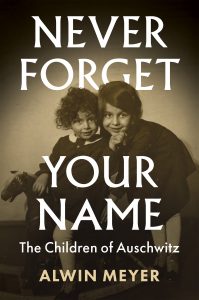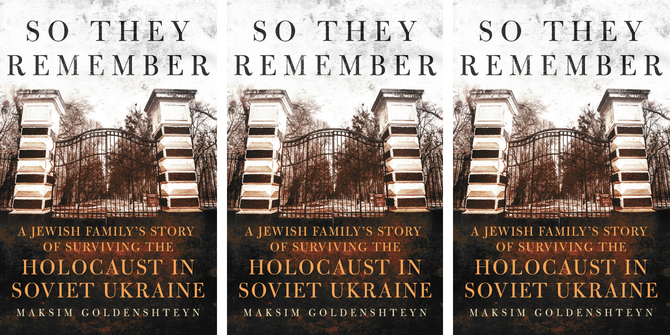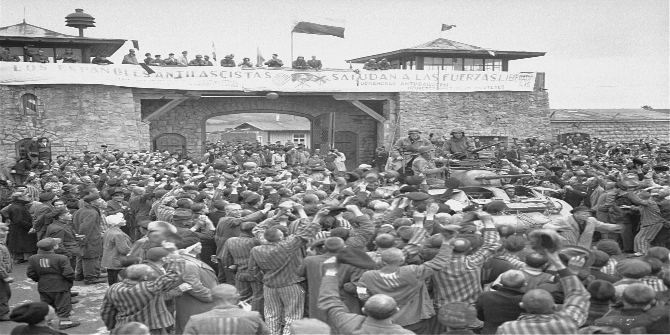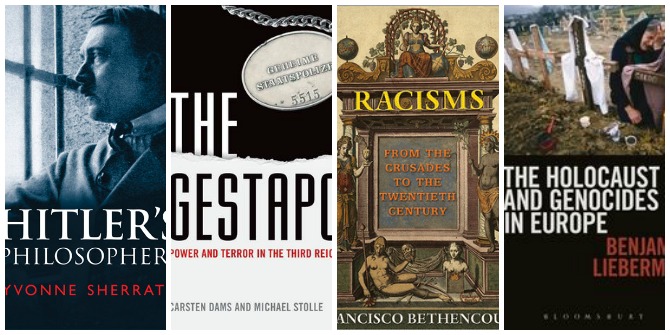27 January is Holocaust Memorial Day when we remember the six million Jews murdered during the Holocaust alongside the millions of other people killed under Nazi persecution and in subsequent genocides. 27 January marks the anniversary of the liberation of Auschwitz-Birkenau, the largest Nazi death camp. While 232,000 children and juveniles were deported to Auschwitz, only 750 were liberated in the death camp at the end of January 1945. For Holocaust Memorial Day, we share an extract from the new Polity book, Never Forget Your Name by Alwin Meyer, which is the culmination of research and interviews with children liberated from Auschwitz and their descendants, sensitively reconstructing their stories.
More information about the book can be found on the Polity website.
Never Forget Your Name: The Children of Auschwitz. Alwin Meyer (translated by Nick Somers). Polity. 2022.
 Very few of the children deported to Auschwitz remained alive. To some extent, the survival of every child was an anomaly unforeseen by the Nazis, a type of resistance to the only fate that Germans had planned for the children – namely, extermination. Very many of the children and juveniles in this book are fully aware that their survival was a matter of pure luck.
Very few of the children deported to Auschwitz remained alive. To some extent, the survival of every child was an anomaly unforeseen by the Nazis, a type of resistance to the only fate that Germans had planned for the children – namely, extermination. Very many of the children and juveniles in this book are fully aware that their survival was a matter of pure luck.
In some cases, comradeship and solidarity among the camp inmates helped them to stay alive. For example, some women relate how their pregnancy remained undetected because of the starvation rations in the camp, enabling them to give birth in secret. Once the child was born, it had practically no chance of survival. SS doctors, medical orderlies and their assistants took the mother and child and killed them. Sometimes, however, the mother managed, with the aid of other women inmates, to hide and feed her baby for a while. This was particularly true of the infants born in the last weeks and days before Auschwitz-Birkenau was liberated (Alwin Meyer, 2021, 104-62).
Others are convinced that they survived through their belief in God. Otto Klein, who, at the age of 11, was claimed with his twin brother Ferenc by Mengele for pseudo-medical experiments, for example, never dared to doubt in God. ‘That would have been the end. Deep down in my heart, I always remained a Jew. No one and nothing could beat that out of me. Not even Auschwitz.’
For the few children who were liberated, the pain is always there: before breakfast, during the day, in the evening, at night. The memory of mothers, fathers, sisters, brothers, the grandparents, girlfriends, boyfriends, aunts and uncles, killed in the camps. For a lifetime and beyond, the pain is ever present, not only in their lives but also in those of their own children and grandchildren.
Even if the number tattooed on the forearm, thigh or buttocks is often the only outward sign that they were in Auschwitz, they bear the traces of suffering on their bodies and in their souls.
The older liberated children of Auschwitz talk about their happy childhoods at home, about school, life in a Jewish community, the relationship between Jewish and non-Jewish children, the arrival of the Germans, the growing apprehension, the refugees, the chaos prior to deportation, the end of playing, the transport in cattle wagons, the arrival in Auschwitz, the mortal fear.
The children remember the gnawing hunger; the experiments carried out on them; the cold that pierced to the bone; the constant selections by the SS; the fear that their number would be called out; the longing for their parents, a good meal, an eiderdown, warmth. They were torn between despair and hope. They wanted to see their mothers and fathers, brothers and sisters again. They wanted to go home. They wanted their old and happy lives back. They wanted to be able to be children again.
Only a few survived Auschwitz and the other camps where they were interned. The children rescued from the camps were just skin and bone. The people caring for them feared that they would not live. They looked like skeletons, with bite wounds from the dogs, bodies covered in sores, eyes stuck together with pus; for a long time, anything they ate went in one end and straight out the other; they had tuberculosis, pneumonia and encephalitis.
Some had no idea where they were from. Practically all of them were orphans. The smaller children in particular were marked by their life in the camp. They spoke a mixture of languages. For a long time, the girls and boys lived in fear that something – particularly food and clothing – would be snatched away from them. Hiding food was part of their survival strategy. They defended it with their lives, because in the camp even the smallest possession had had inestimable value. Every small piece of bread meant survival for one or two days or more. Even spoiled food was not thrown away. When adults who had not been in the camp suggested this, they would look at them incredulously and think to themselves: ‘You have no idea what life is really like!’
The small children were incapable of playing. When they were presented with playthings, they gave them a cursory glance or threw them away. They didn’t know what they were or what to do with them. These children had first to learn how to play. They were irritable and mistrustful. Dogs, rats and uniforms caused indescribable anxiety. When someone left them, some of the smaller children assumed they were dead. Others couldn’t believe at first that people could die of natural causes.
The children of Auschwitz were free, but how could they live after what they had been through? It took them years of painstaking work to learn to see life from a perspective other than that of the camp. They had to learn to survive the camp emotionally. They had to learn to be young again so as to be able to grow old like others.
As they grew older, those children of Auschwitz were increasingly motivated to find out where they came from. In searching for their parents, the numbers tattooed on their arm often helped, because their numbers were tattooed at the same time – first the mother, then the daughter with serial numbers from the Women’s Camp; or the father, then the son, from the Men’s Camp.
Only a few were reunited, years later, with their parents. They were soon conflicted as to who their real mothers and fathers were. In the experience of the author of this book, the answer was always the adoptive parents. They went back to the place where they had experienced most warmth in their lives. For the biological parents, this was a bitter disappointment, losing a son or a daughter for a second time. The others never stopped asking whether their families had been killed in the gas chambers, or had perhaps survived somewhere. They continued to look for their parents, siblings, grandparents and friends – at least in their dreams.
Those who survived Auschwitz as children or juveniles continued to wonder whether their families had really died in the gas chambers. They would come across newspaper articles reporting on the return of people thought dead. Hope made it possible for them to continue living. It was just a dream that they would wake from. Then everything would be fine again. But no one came back.
The survivors’ children and grandchildren can sense how their parents and grandparents suffer. They often know much more than their parents and grandparents think – despite their having done everything possible to protect them from the consequences of Auschwitz.
The children of Auschwitz had to show supreme resolve to make their way in the world. They sought and found new lives, went to school, studied, married, had children, pursued careers and created new homes. But as they got older and no longer had to concern themselves as much with their own families, the memories of Auschwitz returned with a vengeance. Every day, every hour, the pain is there: the memory of their mothers, fathers, brothers and sisters, all murdered. Many can still remember them quite clearly. How they would love to hear their voices again. How they would love once again to speak to their parents and siblings, or to hug them.
The ancestors and descendants of the children of Auschwitz who tell their stories in this book lived and live among us in Będzin, Békéscsaba, Berlin, Bilky, Budapest, Csepel, Czaniec, Davos, Delvin, Dimona, El Paso, Esslingen, Frankfurt am Main, Gdynia, Geneva, Givat Haviva, Haifa, Hajdúböszörmény, Hartford, Herzliya, Hronov, Jerusalem, Kansas City, Kaunas, Konstanz, Kraków, Kutná Hora, London, Los Angeles, Lubin, Miskolc, Montreal, Mukachevo, Naples, New York, Odolice, Orsha, Oslo, Ostrava, Paris, Prague, Providence, Sárospatak, Thessaloniki, Topol’čany, Toronto, Turany nad Ondavou, Vel’ký Meder, Vienna, Vilnius, Vitebsk, Warsaw, Yad Hanna, Yalta, Yenakiieve, Zabrze, Zurich.
When the persections by Nazi Germany began throughout Europe, the children of Auschwitz featured in this book were babies, toddlers and children up to 14 years old. When they were forced to work as slaves or interned for the first time in ghettos or camps, they were all children. When they were transported to Auschwitz-Birkenau, four were juveniles, none of the others older than 15. Four of the children were born in Auschwitz.
The children of Auschwitz interviewed for this book are among the very last survivors. Herbert Adler, Yehuda Bacon, Halina Birenbaum, Robert Büchler, Gábor Hirsch, Lydia Holznerová, Krzysztof J., Otto Klein, Kola Klimczyk, Josif Konvoj, Eduard Kornfeld, Heinz Salvator Kounio, Géza Kozma, Ewa Krcz-Siezka, Vera Kriegel, Dagmar Lieblová, Dasha Lewin, Channa Loewenstein, Israel Loewenstein, Mirjam M., Jack Mandelbaum, Angela Orosz-Richt, Lidia Rydzikowska, Olga Solomon, Jiří Steiner, William Wermuth, Barbara Wesołowska and other children of Auschwitz were willing to tell the story of their survival, and life afterwards.
The life stories of the children of Auschwitz are based above all on numerous lengthy interviews with them, their families and friends. This book could never have been written without the willingness of the children of Auschwitz to provide information, without their hospitality, their openness and their trust. It is their book first and foremost. It contains the life stories of people who know more than others what life means.
Note: This book extract gives the views of the author, and not the position of the LSE Review of Books blog, or of the London School of Economics and Political Science. Thank you to Polity for providing permission to publish an edited extract from Never Forget Your Name: The Children of Auschwitz.







